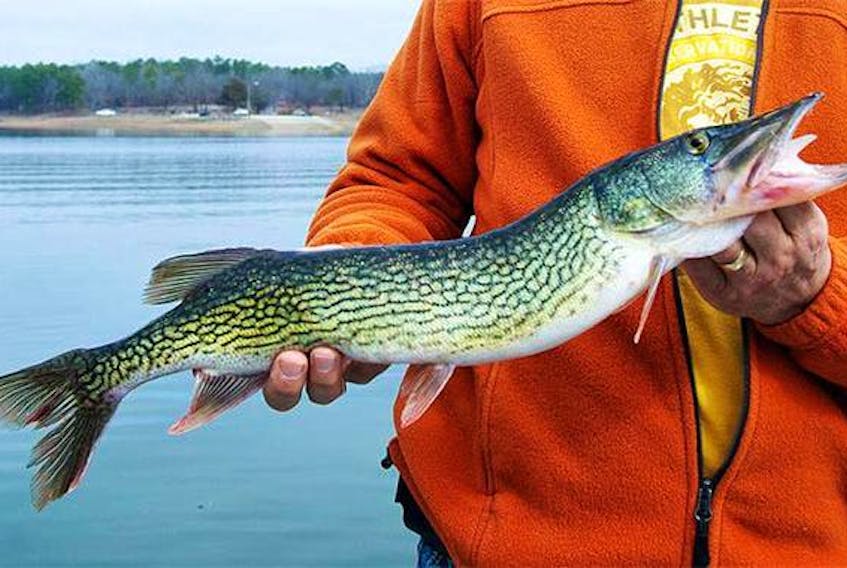I certainly hope that everyone is getting out and that you are catching plenty of fish.
Chain pickerel are the topic for this week. Chain pickerel is another fish found in our waters in Nova Scotia that is not native to our province. These pickerel have been illegally introduced to our lakes and rivers by fishermen who had no idea of the damage that these fish would do to our native stocks.
Chain pickerel are related to pike and musky and look similar to a skinny pike, they can also grow up to a metre long. Chain pickerel, to some extent, have a duck bill mouth that is full of very sharp teeth.
Pickerel are fun to catch; they fight very strong and are good to eat. When filleting pickerel, they do not have the same anatomy as regular fish so you will need to learn how to navigate the Y-bone. Chain pickerel are ambush feeders, so they can be found in shallow water in and around vegetation and around most structures.
Any type of fishing method works and top water fishing is especially fun because pickerel will strike very vigorously. One word of caution is that you need to protect your hooks and lures by adding a steel leader at the end of your line because their very sharp teeth will cut regular fishing line. Another bit of advice is to carry a pair of long nose pliers with you so that you can protect your fingers from those sharp teeth when unhooking the fish.
Many avid fishermen have no use for chain pickerel, and for that matter, small mouth bass, but pickerel are easy to catch and fight extremely hard. No one really knows how much damage chain pickerel will do to resident fish populations but everyone is concerned. When you are fishing this summer and you catch a chain pickerel in a lake that you did not know had chain pickerel, please let inland fisheries know by email at [email protected] or email me. The bag limit for chain pickerel is 100 per day.
Chain pickerel can be found in lakes and rivers that are heavily vegetated. Vegetation provides cover for their ambush style of foraging.
Identifying pickerel
- Long snout.
- Long, slender body with a chain-like pattern on a bright green to olive green to brown background.
- Head is long, flat and depressed above.
- Large, long head with dark bars radiating back from the eyes. Dark vertical bar beneath each eye. Eye has yellow pupil.
- Dorsal fin located back towards long, and deeply forked, caudal fin.
- Sharp teeth (Bluenose Coastal Action Foundation study).
If you are fishing the LaHave River or Wentzells Lake and you hook a chain pickerel with a small grey tag left of the dorsal fin, please record the number of the fish from the tag (1,000-2,000) and report it to Shawn Feener of the Bluenose Coastal Action Foundation at [email protected] or call 902-523-0157. These tagged fish are part of a mark and recapture study to determine the population size within Wentzells Lake.
One thing is for sure though; give pickerel a try and you’ll discover they have more to offer than you ever imagined.
If you have questions and cannot find the answers, then please send me an email.
Upcoming bass tournaments include Lakeside Smallmouth Bass Club, July 28-29, Superbass Tournament on Aug. 11 at Ogden, Parr, Pete’s Lake in Yarmouth and the South Shore Bass Masters has a tournament on Molega Lake in Queens County on Aug. 12.
Carroll Randall owns and operates dacaraFishin out of Lunenburg County and is a Nova Scotia Licensed Fishing Guide. He offers guided fishing adventures and fishing schools. To book a trip or to find out more, call 902-212-1508 or email [email protected].









